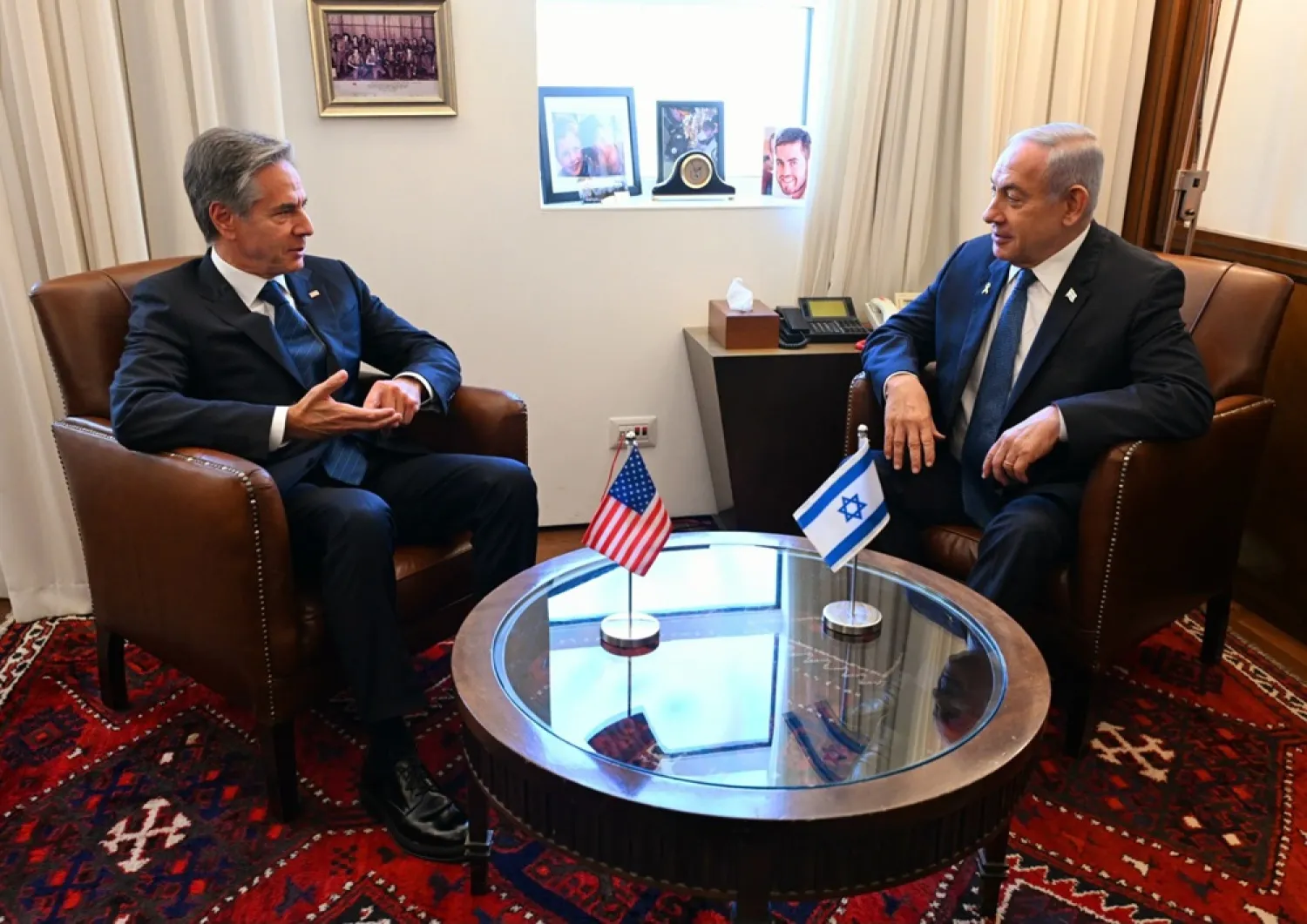US Secretary of State Antony Blinken pressed Israeli Prime Minister Benjamin Netanyahu in talks on Tuesday to capitalize on the killing of Hamas' leader by securing the release of the Oct. 7 attack hostages and ending the war in Gaza.
After repeated abortive attempts to broker a ceasefire between Israel and Hamas, Blinken was making his 11th trip to the Middle East since the Gaza war erupted - and the last before a presidential election that could upend US policy.
Blinken was also looking for ways to defuse an escalating spillover conflict between Israel and the Iran-backed armed group Hezbollah in Lebanon, where overnight at least 18 people were killed, including four children, and 60 injured by an Israeli airstrike near Beirut's main state hospital.
Blinken faced an uphill struggle on both fronts.
He spelled out US hopes that the death of Hamas leader Yahya Sinwar - blamed for triggering a year of devastating warfare by planning the deadly militant assault from Gaza on Israeli territory on Oct. 7 last year - will provide a new opportunity for peace.
"The Secretary underscored the need to capitalize on Israel's successful action to bring Yahya Sinwar to justice by securing the release of all hostages and ending the conflict in Gaza in a way that provides lasting security for Israelis and Palestinians alike," the US State Department said in a statement on the Jerusalem meetings.
In a statement issued by his office, Netanyahu said Sinwar's elimination "may have a positive effect on the return of the hostages, the achievement of all the goals of the war, and the day after the war".
But there was no mention of a possible ceasefire after a year of war in which Hamas' military capabilities have been greatly degraded and Gaza largely reduced to rubble, with most of its 2.3 million Palestinians displaced.
Western allies of Israel see Sinwar's killing last week as a potential breakthrough by providing Netanyahu's far-right government political cover to assert that its objectives have been achieved in Gaza.
But Israel has maintained that it will not stop fighting until the Palestinian armed group has been utterly destroyed as a military force and governing entity in Gaza.
For its part, Hamas has refused to free scores of hostages in Gaza seized in its Oct. 7, 2023 raid on Israel without an Israeli pledge to end the war and pull out of the territory.
The State Department said Blinken and Netanyahu also discussed ways of implementing a long moribund 2006 UN resolution passed after the last Israel-Hezbollah war that would restore security and calm along the Israeli-Lebanese border and allow civilians on both sides to return to their homes.
But as Blinken was huddled with Israeli leaders, Hezbollah ruled out negotiations while fighting continues with Israel, and it claimed responsibility for a drone attack targeting Netanyahu's holiday home on Saturday.
In his statement, Netanyahu also said there was a need for a change in the security and political situation in Lebanon that would allow Israelis to return safely to homes that had come under Hezbollah rocket fire.
Hezbollah announced dozens of attacks against Israeli targets on Tuesday, including what it said were Israeli military sites near Haifa and Tel Aviv, suggesting its capabilities have survived Israel's biggest onslaught in decades of hostilities.
Israel has so far shown no sign of relenting in its Gaza and Lebanon campaigns even after assassinating several leaders of Iran's allies Hamas and Hezbollah, which lost its powerful secretary-general Hassan Nasrallah in a Sept. 27 airstrike.
Diplomats say Israel aims to lock in a strong position before a new US. administration takes over following the Nov. 5 election between Vice President Kamala Harris and former president Donald Trump.
MORE HEAVY AIRSTRIKES ON BEIRUT
UN Human Rights Chief Volker Türk on Tuesday said he was "appalled" by the Israeli strike near the Rafik Hariri University Hospital in Beirut overnight.
The hospital had suffered damage, probably by flying missile debris, according to its director Jihad Saadeh. While there were no casualties among the staff, efforts to rescue people in front of the hospital were ongoing, he added.
The Israeli military said the hospital was not among the targets during a night of heavy airstrikes in Beirut's southern suburbs and south Lebanon.
Israeli strikes continued across Lebanon on Tuesday, including one of which caused the precipitous collapse of a multi-storey building near central Beirut, sending more panicked residents fleeing.
Israel's offensive has driven at least 1.2 million Lebanese from their homes and killed 2,530 people, including at least 63 over the past 24 hours, the Lebanese government said on Tuesday.
Nasser Yassin, Lebanon's minister in charge of coordinating the response to the crisis, told Reuters on Tuesday that at least $250 million was needed monthly to support the displaced.
Wholesale conflict has spread from Gaza to Lebanon over the past month with Israel launching a ground campaign and intensified air assaults on Hezbollah, which had been firing across the frontier for a year in solidarity with Hamas.
Blinken was in Israel at the start of a week-long trip that will also take him to Jordan and Qatar. US officials say he is exploring plans for rebuilding and governing Gaza after the war, key to reaching a ceasefire.
Before the talks, a senior State Department official said Blinken would also address Israel's anticipated retaliation for an Oct. 1 ballistic missile attack by Iran.
Allies are worried that Israel's response could disrupt oil markets and ignite a full-blown war between the arch-enemies.









